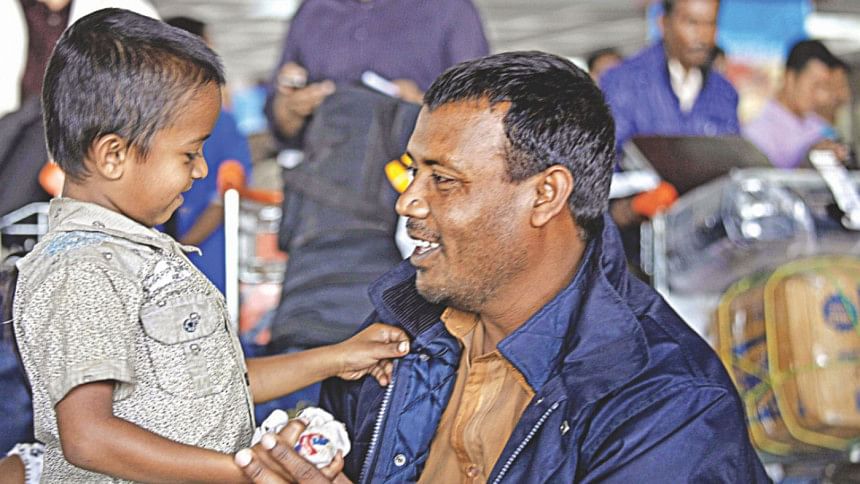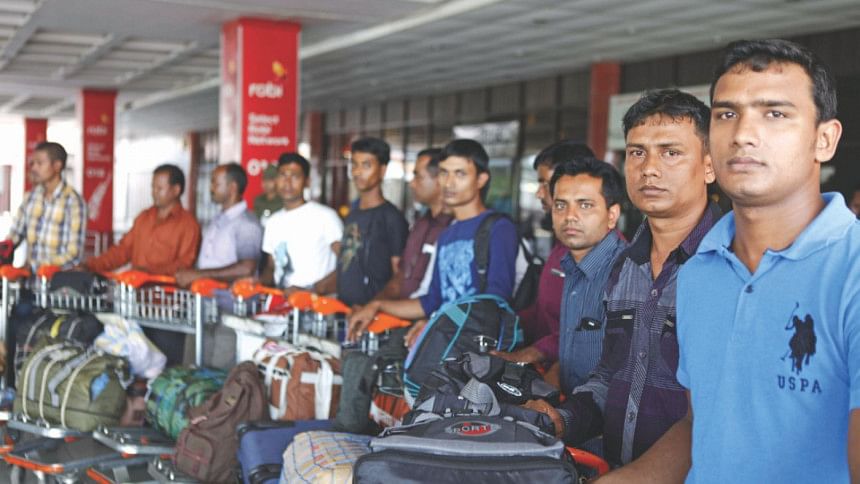Lowering the costs of migration

For many, migration is a route out of poverty and a pathway to live in dignity. It is an integral part of globalisation. The world community has recognised that migration can contribute in achieving the Sustainable Development Goals (SDGs). The 2030 Agenda for Sustainable Development acknowledges that good governance of migration will yield positive dividends for migrants and members of their families as well as countries of origin and destination. The SDG target 10.7 calls for well-managed migration policies. Important references are alluded to migration in SDG 8 (economic growth and decent work) and SDG 16 (peaceful societies).
Over the last four decades Bangladesh has become an important source country of short-term migrant workers. During this period the outward movement of workers has steadily increased and so did the inward remittance flow. By now 10.4 million Bangladeshis went abroad for employment. The remittance figure for 2016 stood at USD 13.7 billion.
The social and economic contributions of migrant workers are now well recognised. Acknowledging the importance of labour migration for the national economy successive governments have undertaken various legislative and administrative measures to streamline the sector. Laws and policies were framed, an international treaty was acceded and quite a few institutions, including a separate ministry, were created to better serve the migrants and to positively harness the gains from labour migration.
The above efforts of the government supplemented by the active engagement of the civil society have created, to an extent, a minimum threshold for the Bangladeshi migrant workers to secure some basic services and to have a degree of prior knowledge about the benefits of migration through regular channels and pitfalls of movement through irregular routes. However, Bangladeshi migrant workers continue to be subjected to exorbitantly high migration costs and insecure work environment in their countries of destination.
A number of sources have validated the fact that Bangladeshis have to bear the highest cost of migration in the region. The World Bank initiative Knowledge Network on Migration and Development (KNOMAD) reported in 2014 that Bangladeshis had to work for nine months in Kuwait simply to recoup the money they had spent to finance migration. In contrast, Indian workers had to work for two and a half months and Sri Lankans for only a month to recover the migration cost. A RMMRU survey of recently deployed migrant workers informs that the average migration cost currently stands at USD 4,800. Another recent report of the ILO on the costs incurred by Bangladeshi workers notes that a male migrant needs to spend BDT 6.5 to 7.5 lakh to go to Saudi Arabia, BDT 5.5 to 6 lakh to go to Lebanon and BDT 2.5 to 3 lakh to migrate to Malaysia. It is worthwhile to recall that the officially stipulated ceiling is BDT 84,000 - a little more than USD 1,000. Recently, for Saudi Arabia, the threshold has been doubled. One may therefore argue that state authorities have failed to implement the provision.
For the migrant, the dalal becomes the sole conduit of information and the medium of monetary transaction. Under such a dispensation the worker remains vulnerable to be fed with misinformation about work, wages, and entitlements and even of the country of destination.
The above figures only reflect financial costs that migrants have to pay upfront including those for obtaining visa, completing exit formalities (passport, medical tests, BMET clearance, etc.) and purchasing air tickets. Those do not include costs that are incurred for (a) general and specific (such as language or skills) training; (b) opportunity costs of wages not earned while preparing and training to go abroad; and (c) social costs associated with separation from family and relatives.
The high cost of migration is a matter of utmost concern for workers, rights activists and policymakers. The problem is further compounded as Bangladeshi workers generally receive lower wages and benefits from their employers than their peers from countries such as India, Sri Lanka, Nepal and the Philippines. This means Bangladeshi workers have to put in many more hours of labour to offset the high migration costs they incur. It also contributes to situations in which these workers have to engage in additional remunerative chores (e.g. washing cars, selling telephone SIMs and work as porters in local markets). Getting involved in such types of work in almost all cases contravenes the terms of contract with the original employer and often constitutes criminal offense under the laws of respective lands. The pressure of clearing outstanding debts that in most cases are incurred to pay for high migration costs, also takes a toll on the mental wellbeing of the workers and members of their families. It also impairs their productivity. The social and economic costs that Bangladeshi migrants bear are huge. Among many factors unethical recruitment practices stand out in shoring up the costs. In this essay an attempt will be made to look into the dynamics of collusion of recruiting agencies with informal intermediaries in Bangladesh and that of visa trading in the countries of destination.

In the absence of direct hiring of workers by employers of the destination countries the recruitment of workers in Bangladesh is done largely in two ways—through social networks and through registered recruiting agencies. Despite the existence of more than a thousand registered labour recruitment agencies in the country almost 80 percent of work visas are procured through social networks. It is the Bangladeshis serving in the countries of destination who secure employment contracts, in most cases after paying an amount to their employers or others, and then transfer those contracts to their relatives or friends back home. The latter scouts for potential buyers of the contract, usually in their locality, and sells them to the highest bidder. It is only in the final stages that registered recruiting agencies get involved in the migration process by facilitating medical tests, securing immigration clearance and purchasing air tickets. The informal trading in visa substantially enhances the cost. As the demand for overseas employment far outweighs the availability of work visas the cost becomes inordinate. The entire visa related transactions in the social network framework fall outside the purview of the regulatory mechanism of the state.
The remaining 20 percent of work visas are procured by the registered agencies. A part of such work visas are secured directly from the employers, usually for skilled positions; and the other part, by purchasing visas that are on offer in destination countries, often through unhealthy bidding with each other by the agencies, further escalating the cost.
As registered recruitment agencies in most instances are based in the metropolitan areas they have little option but to rely on informal intermediaries or sub-agents (popularly known as dalals). The dalals come in handy for the registered agencies to procure workers. This indirect recruitment frees the formal agencies from the onerous task of selecting workers who are prepared to pay hefty sums. It also accords them the liberty to dictate the price of the visa and not being transparent about the job on the offer and its terms and conditions. No less important, it shields the formal agent from bearing any responsibility if things do not work out for the migrant. The absence of direct contact between the formal agent and the aspirant migrant puts the latter at the mercy of the dalals. For the migrant, the dalal becomes the sole conduit of information and the medium of monetary transaction. Under such a dispensation the worker remains vulnerable to be fed with misinformation about work, wages, and entitlements and even of the country of destination. Furthermore, monetary transactions are conducted without any documentation. One can therefore argue that securing employment through a formal registered agency in Bangladesh does not guarantee safeguards to the worker, nor does it ensure implementation of the maximum cost of migration stipulated by the government.
Thus, recruitment costs under both channels (social network and recruitment agencies) continue to remain prohibitively expensive for the Bangladeshi migrants as there is a conscious effort to cash in on the desperation of the people eager to secure overseas employment.
All the Gulf Cooperation Council (GCC) countries have programmes for immigration of unskilled workers. Although the programmes create opportunities for the uneducated and relatively poor people from countries such as Bangladesh to get work, it also subjects them to the pervasive practice of visa trading. Under the scheme, employers in the GCC countries secure authorisation from their respective authorities to bring in workers to work for them. Instead of hiring workers for their own enterprises they sell the visas to the agents. Workers brought under such illegal scheme are then "freed" to find employment. In some instances, they are able to get work; in others, they are either left at the mercy of errant employers and subjected to exploitation and ill treatment or remain jobless for a long period of time. The very fact that these workers on "free visas" work for employers other than the ones who sponsored them makes their status irregular.
The clandestine nature of visa trading makes it difficult to estimate the magnitude of the problem. Past estimates of the ILO noted that as many as 25 percent of the United Arab Emirates' workforce is on "free visa." In recent times, the Labour Ministry of Saudi Arabia acknowledged that many firms were hiring expatriate workers and transferring their sponsorship within the next few months and noted that these companies were trying to mislead the ministry and trading work visas to other firms. It has been reported that recruitment agents pay under-the-table "facilitation fees" to employing company personnel of amounts that range from USD 300 to USD 1,000 per worker. Needless to say, these costs are then passed on to the workers when they purchase the work visa.
In order to attain the target of lowering the costs of migration a concerted effort must be made to ensure direct recruitment of workers by the employers, if need be through effective accountable intermediation of the registered agencies and weeding out parasitical intermediaries at both ends.
There is an urgent need to institute regulatory mechanisms on employment contracts that come through social network. The role of intermediaries, particularly the reasons for the dependence of the workers on informal intermediaries, needs to be evaluated. If direct recruitment by employers cannot be ensured and if efficient alternatives to informal intermediaries cannot be put in place then perhaps time has come to recognise the role that informal intermediaries play in the labour recruitment process and devise ways to make these intermediaries accountable through a process of registration. An assessment should also be made as to why the much celebrated database has virtually remained dysfunctional in facilitating recruitment of workers.
There is also an urgent need for all destination countries to acknowledge the existence of visa trading and take appropriate actions, including collaborating with the countries of origin, to address the problems associated with the practice. Abolition of visa trading is an important pre-condition to reduce migration costs. While there is an element of truth of the claims that nationals of the origin countries based in the countries of destination are linked to facilitation of "free visas" who prey on the difficult economic circumstances of their compatriots, it is no less true that individual sponsors or management of the companies, particularly those belonging to the human resources division, based in the destination countries, also benefit from this illegal act. The Philippines has put in place a strong regulatory structure to limit the extent of visa trading. It can serve as an important model for countries like Bangladesh.
For the first time migration has been incorporated in the global mainstream development agenda. It's time that policymakers of the sending countries and those of the origin countries effectively collaborate so that migrants can maximise the gains from their hard labour and do not have to pay any amount to render their much needed services in the global labour market.
The writer teaches International Relations at the University of Dhaka. He also coordinates the Refugee and Migratory Movements Research Unit (RMMRU).

 For all latest news, follow The Daily Star's Google News channel.
For all latest news, follow The Daily Star's Google News channel. 



Comments